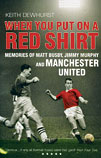 Memories of Matt Busby, Jimmy Murphy and Manchester United
Memories of Matt Busby, Jimmy Murphy and Manchester United
by Keith Dewhurst
Yellow Jersey Press, £8.99
Reviewed by Joyce Woolridge
From WSC 302 April 2012
"It seems almost incredible that the best team in Europe, and one of most thrilling in history, was run by two elderly men who had theories, put players together accordingly and then more or less let them get on with it." Those two elderly men were Matt Busby and his assistant Jimmy Murphy, the hero of Keith Dewhurst's masterly memoir of a partnership that began in a stuffy Nissen hut at the Army Recreation Centre in Bari in the summer of 1945.
When You Put on a Red Shirt is part-autobiography and partly a dissection of what the Busby-Murphy partnership brought to English football and how English football chose wilfully to ignore it. The author recounts vividly how he fell under the spell of Murphy, Busby's assistant, when the Munich air crash left him in temporary charge while Busby fought for his life in hospital in Germany.
Alf Clarke, the long-time Manchester United correspondent for the Evening Chronicle, did not survive the crash. Dewhurst, a literary-minded son of a cotton manager, who had joined the paper on its graduate recruitment programme without telling his parents, stepped up to fill the gap.
He first met Murphy in the Norbreck Hydro, the faded Blackpool hotel in which Murphy assembled his makeshift replacements. Dewhurst, clad in brown corduroy jacket, was initially mistaken for the hotel violinist, before Murphy gripped his elbow and his hand and barked: "Never mind criticism! What we need is support."
The loud and convivial Welshman took a shine to the young reporter. Murphy lives and breathes in these pages, whether passionately expounding his theories about how football should be played over whisky, hot water and sugar toddies in shabby rooms late at night, or rehearsing his grievance about how Busby increasingly came to monopolise the credit and rewards for the youth development work done by Murphy, Bert Whalley and Joe Armstrong.
Although there are muted, subtle asides about Busby's hypocrisy and ruthlessness – and Dewhurst admits that as a younger man he took Murphy's side – the author recognises now that the achievement of the distant, expensively suited politician Busby was to create the conditions in which Murphy and others could work.
What Busby took from that momentous lecture at Bari, Dewhurst surmises, was Murphy's theory of "an absolute balance of talents – constructing teams where its members' strengths and weaknesses would be complemented by their adjacent colleagues". This was the theory on which all three of their great teams were predicated, and which, he argues, has been bypassed, at great cost, particularly to the English national game.
Dewhurst left football journalism to write plays and novels. This accomplished, assured piece of writing is clearly the work of a consummate stylist who has watched football and its reporting change over the decades and knows personally the characters he depicts so compellingly. Even if the prospect of reading about Manchester United is unattractive, do not let that make you miss out on what is probably one of the best football books of its type ever written.